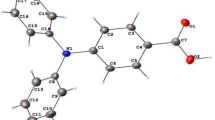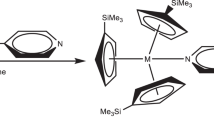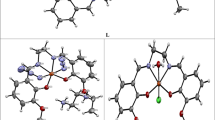Abstract
THE fluorescence of the cerous ion in aqueous solution has been the subject of a number of studies1–3. The emission maximum occurs at about 355 nm, this being excited by absorption at about 265 and 305 nm. The fluorescence is little affected by temperature in the range 10°–40° C, or by strong acids. Nitric acid, however, oxidizes the cerium to the non-fluorescent ceric state. The fluorescence is also affected by the presence of the ceric ion1 and of some other cations2.
This is a preview of subscription content, access via your institution
Access options
Subscribe to this journal
Receive 51 print issues and online access
$199.00 per year
only $3.90 per issue
Buy this article
- Purchase on Springer Link
- Instant access to full article PDF
Prices may be subject to local taxes which are calculated during checkout
Similar content being viewed by others
References
Armstrong, W. A., Grant, D. W., and Humphreys, W. G., Anal. Chem., 35, 1300 (1963).
Poluektov, N. S., Kirillov, A. I., Tischenko, M. A., and Zelyukova, Yu V., Zh. Anal. Khim., 22, 707 (1967).
Kirkbright, G. F., West, T. S., and Woodward, C., Anal. Chim. Acta, 36, 298 (1966).
Author information
Authors and Affiliations
Rights and permissions
About this article
Cite this article
BODEN, H. Quenching of the Fluorescence of the Cerous Ion in Aqueous Solution by some Organic Ligands. Nature 222, 161–162 (1969). https://doi.org/10.1038/222161b0
Received:
Issue Date:
DOI: https://doi.org/10.1038/222161b0
Comments
By submitting a comment you agree to abide by our Terms and Community Guidelines. If you find something abusive or that does not comply with our terms or guidelines please flag it as inappropriate.



